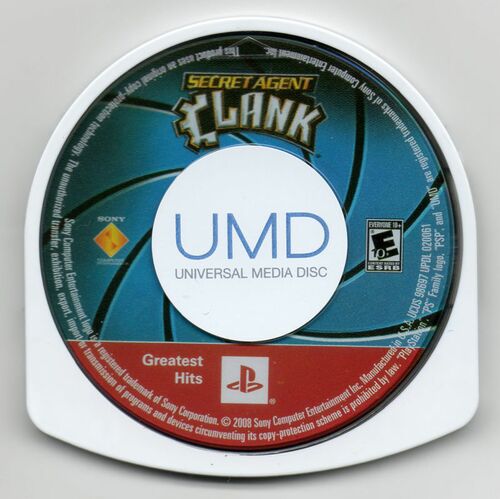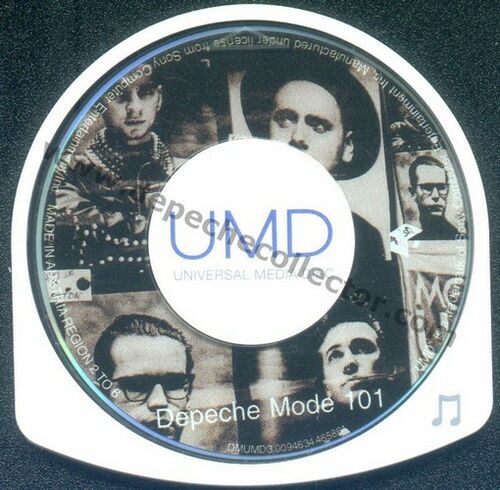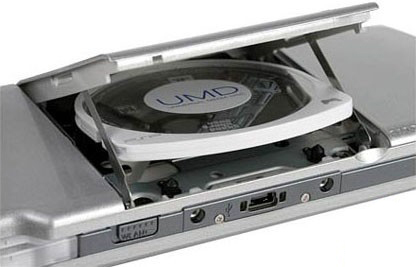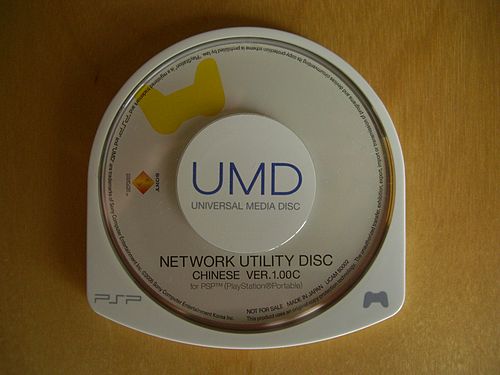Universal Media Disc: Difference between revisions
No edit summary |
EmilDalalyan (talk | contribs) m (Merging of the sections.) |
||
| (11 intermediate revisions by one other user not shown) | |||
| Line 1: | Line 1: | ||
[[File:UMD Logo.png|thumb|UMD logo]] | |||
The '''Universal Media Disc''' ('''UMD''') is an optical disc medium developed by Sony for use on the [[PlayStation Portable]]. It can hold up to 1.8 gigabytes of data. It is considered the first optical disc format to be used for a handheld video game system.<br /> | The '''Universal Media Disc''' ('''UMD''') is an optical disc medium developed by Sony for use on the [[PlayStation Portable]]. It can hold up to 1.8 gigabytes of data. It is considered the first optical disc format to be used for a handheld video game system.<br /> | ||
[https://en.wikipedia.org/wiki/Universal_Media_Disc Source]<br /> | [https://en.wikipedia.org/wiki/Universal_Media_Disc Source]<br /> | ||
==ECMA== | |||
This Ecma Standard specifies the mechanical, physical and optical characteristics of a 60 mm, read-only ODC having a maximum capacity of 1,8 Gbytes. It specifies the physical format, the quality of the recorded signals, the format of the data and its modulation method, thereby allowing for information interchange by means of such ODCs.<br> | |||
This Ecma standard specifies two types of ODCs, Type A and Type B.<br> | |||
This Ecma standard specifies two types of ODCs, Type A and Type B. | |||
* Type A: Single layer disk with maximum recorded capacity of 0,9 G-bytes | * Type A: Single layer disk with maximum recorded capacity of 0,9 G-bytes | ||
| Line 17: | Line 14: | ||
[http://web.archive.org/web/20070124024810/http://www.ecma-international.org:80/publications/standards/Ecma-365.htm Source] | [http://web.archive.org/web/20070124024810/http://www.ecma-international.org:80/publications/standards/Ecma-365.htm Source] | ||
==Specification== | |||
* 60mm | |||
* Laser Diode:660nm | |||
* Dual Layer :1.8GB | |||
* Transfer Rate:11Mbps | |||
* Shock Proof | |||
* Secure ROM by AES | |||
* Unique Disc ID | |||
==Images== | ==Images== | ||
'''Game UMD''' | '''Game UMD''' | ||
[[File:Game UMD.jpg|none|500px]]<br> | |||
'''Movie UMD''' | '''Movie UMD''' | ||
[[File:Movie UMD.jpg|none|500px]]<br> | |||
'''Music UMD''' | '''Music UMD''' | ||
[[File:Music UMD.jpg|none|500px]]<br> | |||
'''UMD Inside PSP''' | |||
[[File:UMD Inside PSP.jpg|none|500px]]<br> | |||
<br | '''Network Utility Disc UMD''' | ||
[[File:Network Utility Disc UMD .jpg|none|500px]]<br> | |||
'''UMD Inside PSP''' | |||
<br | |||
'''Network Utility Disc UMD''' | |||
== | ==Other== | ||
[https://rebeccajanemorgan.medium.com/umd-video-a-history-of-film-on-the-playstation-portable-84ab4dbe856a UMD Video: A history of film on the PlayStation Portable] | |||
Latest revision as of 03:30, 25 March 2023
The Universal Media Disc (UMD) is an optical disc medium developed by Sony for use on the PlayStation Portable. It can hold up to 1.8 gigabytes of data. It is considered the first optical disc format to be used for a handheld video game system.
Source
ECMA[edit | edit source]
This Ecma Standard specifies the mechanical, physical and optical characteristics of a 60 mm, read-only ODC having a maximum capacity of 1,8 Gbytes. It specifies the physical format, the quality of the recorded signals, the format of the data and its modulation method, thereby allowing for information interchange by means of such ODCs.
This Ecma standard specifies two types of ODCs, Type A and Type B.
- Type A: Single layer disk with maximum recorded capacity of 0,9 G-bytes
- Type B: Dual layer disk with maximum recorded capacity of 1,8 G-bytes
Information interchange between systems also requires, at a minimum, agreement between the interchange parties upon the interchange code(s) and the specifications of the structure and labeling of the information on the interchanged ODCs.
Source
Specification[edit | edit source]
- 60mm
- Laser Diode:660nm
- Dual Layer :1.8GB
- Transfer Rate:11Mbps
- Shock Proof
- Secure ROM by AES
- Unique Disc ID
Images[edit | edit source]
Game UMD
Movie UMD
Music UMD
UMD Inside PSP
Network Utility Disc UMD





